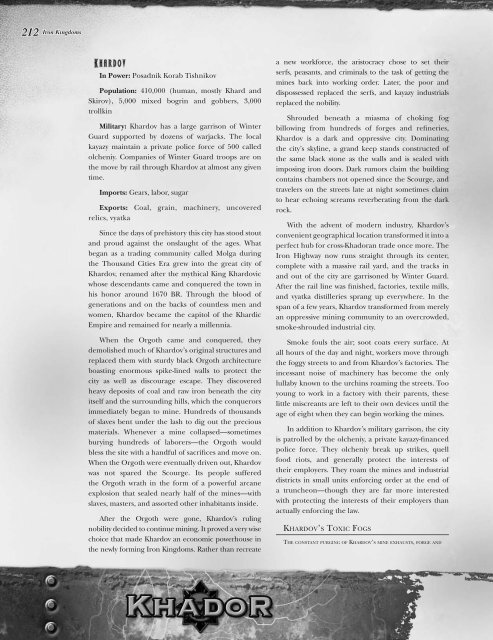02 - Iron Kingdoms W.. - Captain Spud Is Amazing
02 - Iron Kingdoms W.. - Captain Spud Is Amazing
02 - Iron Kingdoms W.. - Captain Spud Is Amazing
Create successful ePaper yourself
Turn your PDF publications into a flip-book with our unique Google optimized e-Paper software.
212 <strong>Iron</strong> <strong>Kingdoms</strong><br />
108.1.141.197<br />
Khardov<br />
In Power: Posadnik Korab Tishnikov<br />
Population: 410,000 (human, mostly Khard and<br />
Skirov), 5,000 mixed bogrin and gobbers, 3,000<br />
trollkin<br />
Military: Khardov has a large garrison of Winter<br />
Guard supported by dozens of warjacks. The local<br />
kayazy maintain a private police force of 500 called<br />
olcheniy. Companies of Winter Guard troops are on<br />
the move by rail through Khardov at almost any given<br />
time.<br />
Imports: Gears, labor, sugar<br />
Exports: Coal, grain, machinery, uncovered<br />
relics, vyatka<br />
Since the days of prehistory this city has stood stout<br />
and proud against the onslaught of the ages. What<br />
began as a trading community called Molga during<br />
the Thousand Cities Era grew into the great city of<br />
Khardov, renamed after the mythical King Khardovic<br />
whose descendants came and conquered the town in<br />
his honor around 1670 BR. Through the blood of<br />
generations and on the backs of countless men and<br />
women, Khardov became the capitol of the Khardic<br />
Empire and remained for nearly a millennia.<br />
When the Orgoth came and conquered, they<br />
demolished much of Khardov’s original structures and<br />
replaced them with sturdy black Orgoth architecture<br />
boasting enormous spike-lined walls to protect the<br />
city as well as discourage escape. They discovered<br />
heavy deposits of coal and raw iron beneath the city<br />
itself and the surrounding hills, which the conquerors<br />
immediately began to mine. Hundreds of thousands<br />
of slaves bent under the lash to dig out the precious<br />
materials. Whenever a mine collapsed—sometimes<br />
burying hundreds of laborers—the Orgoth would<br />
bless the site with a handful of sacrifices and move on.<br />
When the Orgoth were eventually driven out, Khardov<br />
was not spared the Scourge. Its people suffered<br />
the Orgoth wrath in the form of a powerful arcane<br />
explosion that sealed nearly half of the mines—with<br />
slaves, masters, and assorted other inhabitants inside.<br />
After the Orgoth were gone, Khardov’s ruling<br />
nobility decided to continue mining. It proved a very wise<br />
choice that made Khardov an economic powerhouse in<br />
the newly forming <strong>Iron</strong> <strong>Kingdoms</strong>. Rather than recreate<br />
a new workforce, the aristocracy chose to set their<br />
serfs, peasants, and criminals to the task of getting the<br />
mines back into working order. Later, the poor and<br />
dispossessed replaced the serfs, and kayazy industrials<br />
replaced the nobility.<br />
Shrouded beneath a miasma of choking fog<br />
billowing from hundreds of forges and refineries,<br />
Khardov is a dark and oppressive city. Dominating<br />
the city’s skyline, a grand keep stands constructed of<br />
the same black stone as the walls and is sealed with<br />
imposing iron doors. Dark rumors claim the building<br />
contains chambers not opened since the Scourge, and<br />
travelers on the streets late at night sometimes claim<br />
to hear echoing screams reverberating from the dark<br />
rock.<br />
With the advent of modern industry, Khardov’s<br />
convenient geographical location transformed it into a<br />
perfect hub for cross-Khadoran trade once more. The<br />
<strong>Iron</strong> Highway now runs straight through its center,<br />
complete with a massive rail yard, and the tracks in<br />
and out of the city are garrisoned by Winter Guard.<br />
After the rail line was finished, factories, textile mills,<br />
and vyatka distilleries sprang up everywhere. In the<br />
span of a few years, Khardov transformed from merely<br />
an oppressive mining community to an overcrowded,<br />
smoke-shrouded industrial city.<br />
Smoke fouls the air; soot coats every surface. At<br />
all hours of the day and night, workers move through<br />
the foggy streets to and from Khardov’s factories. The<br />
incessant noise of machinery has become the only<br />
lullaby known to the urchins roaming the streets. Too<br />
young to work in a factory with their parents, these<br />
little miscreants are left to their own devices until the<br />
age of eight when they can begin working the mines.<br />
In addition to Khardov’s military garrison, the city<br />
is patrolled by the olcheniy, a private kayazy-financed<br />
police force. They olcheniy break up strikes, quell<br />
food riots, and generally protect the interests of<br />
their employers. They roam the mines and industrial<br />
districts in small units enforcing order at the end of<br />
a truncheon—though they are far more interested<br />
with protecting the interests of their employers than<br />
actually enforcing the law.<br />
khardov’s toxic fogs<br />
the constant purging of khardov’s mine exhausts, forge and


